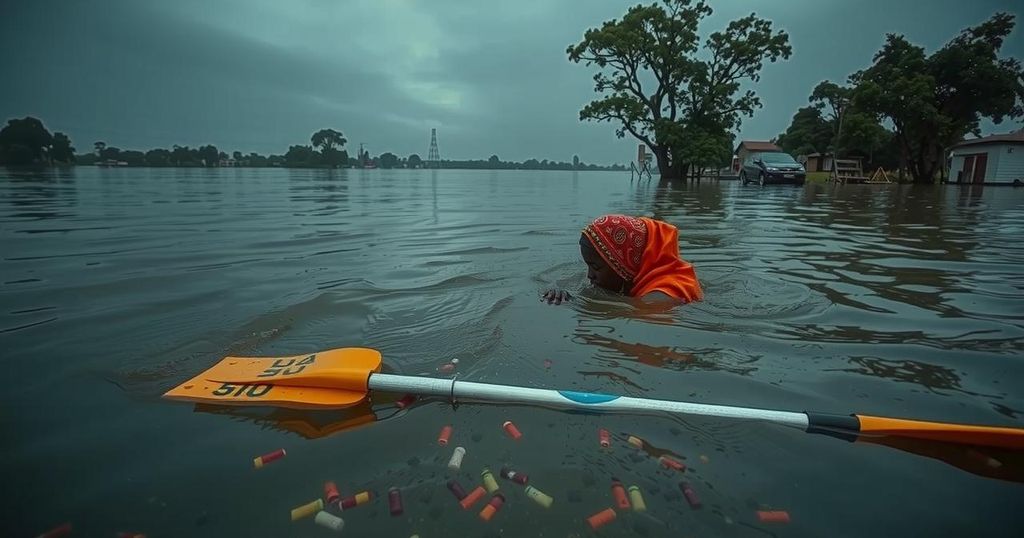IRC Issues Warning on Rising Cholera Cases Amid Severe Flooding in Nigeria and Niger
The International Rescue Committee (IRC) reports a 239% increase in cholera deaths in Nigeria for 2024, coinciding with severe flooding that has overwhelmed healthcare services, particularly in Borno State. Niger also reports significant cholera cases, prompting urgent calls for increased resources to manage the outbreak. The IRC is expanding its treatment capacity and healthcare initiatives in flood-affected areas while emphasizing the need for collaboration to address the public health crisis and enhance community resilience against future disasters.
The International Rescue Committee (IRC) has raised alarms about a significant uptick in cholera cases resulting from severe flooding in Nigeria and Niger. Reports indicate a staggering 239% increase in cholera-related fatalities in Nigeria in 2024, with 359 deaths documented thus far. The IRC has observed that their cholera treatment unit at the Gubio Internally Displaced Persons (IDP) camp in Borno State is currently overwhelmed, operating at full capacity. Meanwhile, Niger has recorded 881 cholera cases and 18 deaths amid the ongoing floods, which have devastated over 1 million individuals. The IRC is actively addressing this critical health crisis in Nigeria, especially in Borno State, while closely monitoring the situation in Niger. The organization asserts that cholera is particularly dangerous in regions lacking access to clean water, which necessitates immediate action to mitigate the spread of the disease. The severe flooding across West Africa has exacerbated pre-existing humanitarian challenges, impacting approximately 1.4 million people in Niger alone, nearly tripling those affected in 2020. To counteract cholera, the IRC is expanding its health, sanitation, and hygiene initiatives in Borno State. In collaboration with the state government, the IRC has established a fully equipped 20-bed cholera treatment unit at the Gubio IDP camp, staffed by trained healthcare professionals providing round-the-clock care. With the unit filled to capacity, the IRC is working diligently to increase bed availability. Furthermore, oral rehydration points have been set up in flood-stricken areas to facilitate prompt treatment for acute diarrhea. The IRC teams are also engaging local communities to identify potential cholera cases and prepare medical supplies in anticipation of potential outbreaks. IRC officials are emphasizing the urgent need for resources to increase their operational capacity. Melody Munz, IRC Niger Country Director, underscored the dire circumstances by stating, “This is the worst case of flooding we have ever seen in Niger, leaving thousands vulnerable to preventable diseases. Without urgent action, more lives are at risk.” Babatunde Ojei, IRC Nigeria Country Director, emphasized the collaborative efforts with local health authorities to manage the outbreak effectively, stating, “Time is of the essence. We call on all stakeholders… to join hands in providing the necessary resources and support to control this outbreak and prevent further loss of life.” Additionally, both directors highlighted the necessity for proactive climate financing strategies to better equip communities in flood-prone regions like Nigeria and Niger for future disasters. The IRC has initiated forecasting systems in various states to anticipate floods and provide timely assistance, thereby enhancing community resilience against such calamities.
The cholera epidemic in Nigeria and Niger is closely linked to the recent floods that have exacerbated existing humanitarian crises in the region. Cholera is a highly contagious disease that thrives in unsanitary conditions, making it particularly dangerous in overcrowded and vulnerable communities lacking access to clean water. The IRC has identified urgent needs for humanitarian support in light of the increasing cholera cases and the environmental impact of flooding, which has significantly affected public health and safety. The humanitarian situation in 2024 has seen remarkable deterioration, with established treatment infrastructures like the IRC’s cholera unit facing overwhelming demand and limited resources. As this situation unfolds, the ability of organizations like the IRC to respond effectively hinges on the availability of additional resources to combat outbreaks and provide essential services to those in need. The current circumstances also emphasize the growing need for climate change preparedness, as the frequency and severity of such environmental disasters continue to increase, necessitating a shift in how aid organizations allocate resources and plan interventions in vulnerable regions.
In conclusion, the IRC is calling for urgent support as cholera cases surge in Nigeria and Niger following devastating floods. The organization reports alarming increases in cases and fatalities, urging immediate action to expand healthcare services and sanitation programs. Stakeholders are encouraged to contribute resources to combat the cholera outbreak effectively and enhance community resilience against the ongoing impacts of climate change. The IRC’s strategic approach emphasizes both immediate response and long-term preventative measures to safeguard vulnerable populations from preventable diseases such as cholera.
Original Source: www.rescue.org




Post Comment